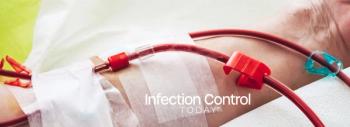
Stopping Pathogen Transmission in the Sterile Processing Department Starts With PPE
Halting transmission of infectious pathogens in the sterile processing department hinges on proper personal protective equipment, proper hand hygiene, and proper cough and sneeze etiquette.
Halting transmission of infectious pathogens in the sterile processing department hinges on proper personal protective equipment (PPE), proper hand hygiene, and proper cough and sneeze etiquette, according to a poster1 presented at the
The current challenge for many sterile processing department (SPD) managers is that staff are either not wearing appropriate PPE or are not wearing it correctly (ie, nose sticking out of face mask or not wearing a face mask at all). Improper PPE creates opportunities for the transmission of microorganisms, author Arthur Henderson, RN, BA, CNOR,CRCST, CHL, ASQ-CQIA, GTS, senior clinical education specialty with STERIS, reported. This can include direct transmission (contact or droplet) or indirect transmission (airborne, fomite, or vector).
Additionally, some infections can take years to show, depending on the type of pathogen. Infections stemming from viruses, bacteria, or parasites typically trigger symptoms within days, weeks, or months, but certain prion infections can have years-long incubation periods, meaning an individual can be infected, not know it, and continue to spread infectious microbes.
For SPD professionals, PPE is key. In his poster, Henderson highlights a number of reasons why appropriate PPE is not worn at all times. First, staff members may not understand microbe transmission or perhaps may feel they should not have to wear PPE at all times (ie, when dropping off equipment or making a quick delivery to the SPD). Second, fit may be an issue, as one-size-fits-all may not actually fit everybody, or it could be uncomfortable and/or ill-fitting.
Henderson offered some best practices for PPE in the SPD. In general, utility gloves must extend beyond the fluid absorbent cloth of the gown; backless gowns should cover all scrub surfaces; fluid-resistant shoe covers should be worn; fluid-resistant face masks should cover the nose and mouth with no gaps present; full length face shields should be used to protect against splashes; and street clothes should be worn to and from the SPD.
The onus, Henderson reported, is on management to provide appropriate and properly fitted PPE for all employees. This includes:
- Training and documenting proper use, care, and cleaning of PPE,
- Auditing staff to ensure proper use and care of PPE,
- Ensuring defective or damaged PPE or equipment is immediately replaced.
SPD personnel must also liaise with infection prevention and control (IPC) to conduct risk assessments and to notify IPC when potential new hazards are introduced or when processes change.
Finally, Henderson notes that proper hand hygiene and cough and sneeze etiquette also contribute to the prevention of infections in the SPD.
Reference:
Henderson, A. Roadblock ahead: stopping infection transmission in sterile processing department. Poster presented at: Healthcare Sterile Processing Association Annual Conference & Expo; San Antonio, Texas; April 23-27, 2022.
Newsletter
Stay prepared and protected with Infection Control Today's newsletter, delivering essential updates, best practices, and expert insights for infection preventionists.




